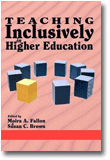
Teaching Inclusively in Higher Education
Edited by:
Moira A. Fallon, SUNY – College at Brockport
Susan C. Brown
Published 2010
This book is designed for higher education instructors. The focus of the book is to assist all faculty instructors in higher education to better meet the needs of their student populations. It addresses the major issue of higher education teaching today: the need to reach all higher education students using active learning strategies. Higher education today is rapidly changing and faculty members are being presented with new types of students: ones who often have clear goals for bettering themselves, but at the same time lack what might have been considered to be basic skills necessary for success in a college or university setting. Instructors today must reach and bring all students into the college or university setting in an inclusive manner. The emphasis of this book is on student-focused strategies for teaching inclusively. This book will provide valuable strategies and practical techniques for instructors to develop inclusive college classrooms that promote the learning of all students.
The audience targeted will be all instructors who work with higher education students, including students in community colleges and vocational institutions. The book is designed to be mainly practical instructional strategies with limited theoretical text and references. At the same time, major theories will be included to demonstrate why specific approaches are recommended. Although the authors and editors are from the field of education, the book is particularly valuable for all college instructors without a background in the discipline of education.
CONTENTS
PART 1: STUDENTS AS DIVERSE INDIVIDUALS AND MEMBERS OF INCLUSIVE GROUPS 1. A Student-Centered Approach to College Classrooms, Moira A. Fallon and Susan C. Brown. 2. Students as Cultural Beings, Susan C. Brown. 3. When Reading in College is a Problem: What Really Matters? Alexander B. Casareno. PART II: INCLUSIVE INSTRUCTORS AS STRATEGIC LEADERS AND COLEARNERS 4. Changing Instructional Strategies and Methods to Meet the Needs of All Learners, Moira A. Fallon. 5. The Changing Role of Instructors as Both Leaders and Learners, Paul T. Parkison. 6. Using Language Successfully in the College Classroom, Ellyn L. Arwood and Joanna R. Kaakinen. PART III: TECHNOLOGICAL CLASSROOM CLIMATES AS INCLUSIVE
LEARNING COMMUNITIES 7. Technology Connecting Curriculum, Instruction, and Assessment, Mark C. Geary. 8. Reaching Students through a Virtual Community, Shelley B. Harris, Jennifer C. Wilson and Jacqueline M. Ferguson. 9. The Technological Age of Teaching, Michelle Pulaski Behling and Beth Gordon Klingner.
10. Applications to Inclusive College Classrooms, Moira A. Fallon, Susan C. Brown, and Alexander B. Casareno
Authors’ Biographies
REVIEWS
"Teaching Inclusively in Higher Education (2010) is a book that surpasses expectations in terms of practicality and applicability. More a guide than a loose set of examples, each chapter provides readers with a hands-on approach to inclusive teaching practices. Based on the need to shift teaching and learning methods to reflect the diversity in student population, this text creates a space, which characterizes and utilizes difference as a learning tool instead of a learning detractor." Robyn Sheridan & Saran Donahoo Southern Illinois University—Carbondale in Education Review (Read full review)
"Moira A. Fallon and Susan C. Brown's Technical Inclusively in Higher Education is a collaborative volume written by scholars in the field of education interested in pedagogical methods and strategies that make learning accessible to a more diversified college population. College faculty and instructors who sense that their classroom environments are increasingly complex in ways difficult to parse and educators perplexed by institutional pressures to change time-honored teaching methods will find the book illuminates the increasing diversity of student learners and the orientation of education scholars assessing its implications for teaching." Miriam Y. Perkins Emmanuel Christian Seminary
-
Paperback978-1-60752-445-8
Web price: $45.04 (Reg. 52.99)
-
Hardcover978-1-60752-446-5
Web price: $80.74 (Reg. 94.99)
- eBook9781607524472

-
 (Re)Envisioning Social Studies Education Research
Current Epistemological and Methodological Expansions, Deconstructions, and Creations
(Re)Envisioning Social Studies Education Research
Current Epistemological and Methodological Expansions, Deconstructions, and Creations
-
 Affirming Identity, Advancing Belonging, and Amplifying Voice in Sororities and Fraternities
Affirming Identity, Advancing Belonging, and Amplifying Voice in Sororities and Fraternities
-
 Effective Alternative Assessment Practices in Higher Education
Effective Alternative Assessment Practices in Higher Education
-
 Expanding the Vision of Faculty Learning Communities in Higher Education
Emerging Opportunities for Faculty to Engage Each Other in Learning, Teaching, and Support
Expanding the Vision of Faculty Learning Communities in Higher Education
Emerging Opportunities for Faculty to Engage Each Other in Learning, Teaching, and Support
-
 Institutional Diversity in American Postsecondary Education
Institutional Diversity in American Postsecondary Education
-
 Promoting Equitable Classroom Practices in Higher Education
Approaches Beyond Curriculum
Promoting Equitable Classroom Practices in Higher Education
Approaches Beyond Curriculum
-
 The Handbook for Aspiring Higher Education Leaders
The Handbook for Aspiring Higher Education Leaders

